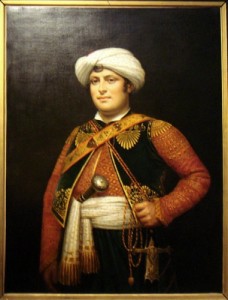
the great emperor’s famous bodyguard, and soon accompanied Napoleon in peace and wars. It is known that a few hours before the battle in Vagram Napoleon wanted to personally inspect the location and position of the enemy and after having given a farewell to the generals he asked them to bring him his spyglasses and tell Roustam to accompany him.
Another time on the heights of Mon-Zhen Mount, France, Napoelon and his group were caught out by the snowfalls and Roustam was the person who took him to the vodka seller’s place in his hands, where, afterwards, Napoleon had confessed: “Roustam is a very strong and courageous boy.” Roustam had his own room, horses and his total remuneration amounted to 4400 franc, plus the sum Napoleon usually gave him after winning at Poker. Roustam was 25 when he married Mademoiselle Douville in Dourdan, France in 1806.
Though Roustam lived in a foreign environment, he never forgot his Armenian roots and did everything to help his country. It’s noteworthy mentioning that when the Kingdom of Italy was decomposed by Napoleon’s proclamation in 1810, the Mkhitaryan Union was kept aside. Besides, Roustam asked Napoleon to save the Armenian Church in Russia in 1812. Beside being a mamluk, Rustam was also a great warrior in the French army. He accompanied the emperor in the first/second wars of Austria, Prussia, Poland, Spain, Moscow, Dresden, Italy, Venice, France, Dutch and was wounded for several times. But Roustam was not with Napoleon when the later was exiled to island Elba. In his diary Roustam quoted that he couldn’t leave his family and be with the emperor in Elba.
In 1815-1825 Roustam lived in Paris and was engaged in haunting. In 1825, there began a persecution against all the mamluks and Roustam had to leave for Paris and be settled in Durdan, where he wrote the book titled as “Life of Roustam Raza till 1814.” Roustam Raza died on December 7, 1845, and was buried in Durdan.
Rustam Raza – Great Emperor’s Bodyguard
Back To Top










